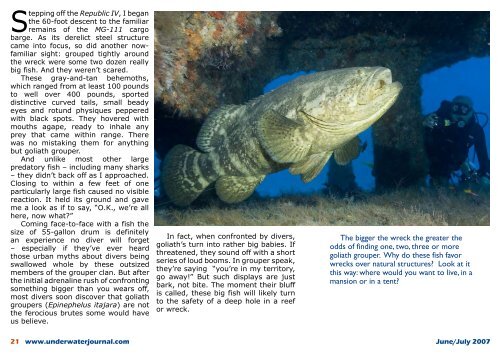- REBREATHERS - SPORT DIVERS ... - Stingray Divers
- REBREATHERS - SPORT DIVERS ... - Stingray Divers
- REBREATHERS - SPORT DIVERS ... - Stingray Divers
Create successful ePaper yourself
Turn your PDF publications into a flip-book with our unique Google optimized e-Paper software.
Stepping off the Republic IV, I began<br />
the 60-foot descent to the familiar<br />
remains of the MG-111 cargo<br />
barge. As its derelict steel structure<br />
came into focus, so did another nowfamiliar<br />
sight: grouped tightly around<br />
the wreck were some two dozen really<br />
big fish. And they weren’t scared.<br />
These gray-and-tan behemoths,<br />
which ranged from at least 100 pounds<br />
to well over 400 pounds, sported<br />
distinctive curved tails, small beady<br />
eyes and rotund physiques peppered<br />
with black spots. They hovered with<br />
mouths agape, ready to inhale any<br />
prey that came within range. There<br />
was no mistaking them for anything<br />
but goliath grouper.<br />
And unlike most other large<br />
predatory fish – including many sharks<br />
– they didn’t back off as I approached.<br />
Closing to within a few feet of one<br />
particularly large fish caused no visible<br />
reaction. It held its ground and gave<br />
me a look as if to say, “O.K., we’re all<br />
here, now what?”<br />
Coming face-to-face with a fish the<br />
size of 55-gallon drum is definitely<br />
an experience no diver will forget<br />
– especially if they’ve ever heard<br />
those urban myths about divers being<br />
swallowed whole by these outsized<br />
members of the grouper clan. But after<br />
the initial adrenaline rush of confronting<br />
something bigger than you wears off,<br />
most divers soon discover that goliath<br />
groupers (Epinephelus itajara) are not<br />
the ferocious brutes some would have<br />
us believe.<br />
2<br />
In fact, when confronted by divers,<br />
goliath’s turn into rather big babies. If<br />
threatened, they sound off with a short<br />
series of loud booms. In grouper speak,<br />
they’re saying “you’re in my territory,<br />
go away!” But such displays are just<br />
bark, not bite. The moment their bluff<br />
is called, these big fish will likely turn<br />
to the safety of a deep hole in a reef<br />
or wreck.<br />
The bigger the wreck the greater the<br />
odds of finding one, two, three or more<br />
goliath grouper. Why do these fish favor<br />
wrecks over natural structures? Look at it<br />
this way: where would you want to live, in a<br />
mansion or in a tent?<br />
www.underwaterjournal.com June/July 2007






